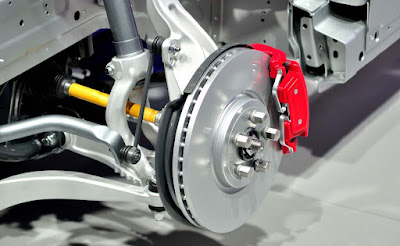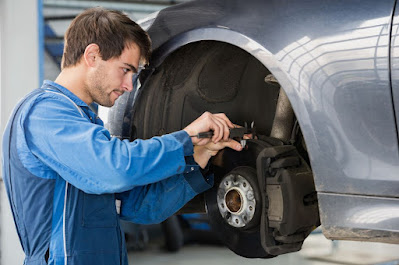Your
vehicle's brake system is not just a convenience; it's a critical component for
your safety on the road. Proper brake system maintenance is essential to ensure
your vehicle can stop quickly and effectively when you need it to. In this
article, we'll explore the various aspects of brake system maintenance and the
warning signs that indicate potential problems.
Understanding
the Components
Before delving into maintenance and warning signs, let's
first understand the key components of your vehicle's brake system:
1.
Brake Pads: These are the parts that press against the brake rotors to
create friction and slow down your vehicle.
2.
Brake Rotors: Also known as brake discs, these are the flat, shiny discs
that the brake pads clamp down on to stop your vehicle.
3.
Brake Calipers: These are responsible for holding the brake pads in place
and exerting the necessary pressure on the rotors.
4.
Brake Fluid: This hydraulic fluid transmits the force applied to the
brake pedal to the brake pads and calipers, allowing them to work together.
Brake
System Maintenance
Regular
Inspection
Regular inspections are crucial to ensuring your brake system's health. This can be done during routine vehicle maintenance or whenever you notice potential issues. Inspect your brake system for any signs of wear and tear, and if you're in the Brisbane area, you can also consider reaching out to local car parts Brisbane suppliers for any necessary replacement components. Key components to check include:
·
Brake Pad Thickness: Brake pads wear down over time. If they are too thin, they
may need replacement.
·
Brake Fluid Levels: Low brake fluid can lead to decreased brake performance.
Check your brake fluid reservoir.
·
Brake Lines: Look for visible leaks, as these could indicate a problem.
·
Brake Rotors: Inspect for signs of wear or warping, such as grooves or
uneven surfaces.

Brake
Pad Replacement
Worn brake pads can lead to reduced braking efficiency.
Signs that your brake pads are due for replacement include:
·
Squeaking or Squealing: This noise is often caused by a wear indicator that alerts
you to the need for new brake pads.
·
Reduced Braking Performance: If it takes longer to stop or you need to press the brake
pedal harder, it may be time to replace the pads.
Brake
Fluid Check and Replacement
Brake fluid plays a critical role in transmitting force from
the brake pedal to the brake pads. Signs that your brake fluid needs attention
include:
·
Soft or Spongy Brake Pedal: A soft brake pedal may indicate air or moisture in the
brake fluid. It should feel firm when pressed.
·
Contaminated Fluid: Brake fluid can become contaminated over time. If it
appears discolored or dirty, it's time to replace it.
Warning
Signs of Brake Problems
If you experience any of the following warning signs, it's
essential to address them promptly:
Squeaking
or Squealing Brakes
Squeaking or squealing noises when you apply the brakes can
signal worn brake pads. It's crucial to replace them to maintain optimal
stopping power.
Vibrations
or Shaking
If you feel vibrations or shaking when you apply the brakes,
this could indicate warped brake rotors. Ignoring this issue can lead to
further damage and increased braking distances.
Soft
or Spongy Brake Pedal
A soft or spongy brake pedal suggests a problem with the
brake fluid or air in the brake lines. This can compromise your ability to stop
your vehicle effectively.
Brake
Warning Lights
Modern vehicles are equipped with brake warning lights on
the dashboard. If any of these lights illuminate, it's a clear indicator that
your brake system needs attention. Don't ignore these warnings.
Common
Brake System Problems
In addition to the warning signs mentioned above, there are
other common brake system issues to be aware of:
Brake
Fluid Leaks
Leaking brake fluid is a significant concern, as it can lead
to reduced brake performance. Look for signs of fluid under your vehicle or
around the wheels.
Worn
or Warped Brake Rotors
Worn or warped brake rotors can result in uneven braking and
vibrations. Addressing this issue often involves rotor resurfacing or
replacement.
Brake
Caliper Issues
Caliper problems can cause uneven braking and reduced
performance. They may need to be serviced or replaced to restore proper brake
function.
DIY
vs. Professional Brake System Maintenance
While some brake system maintenance tasks can be performed
by the DIY enthusiast, it's crucial to recognize your limits. Brake systems are
complex and critical to your safety, so if you're unsure about any aspect of
maintenance, it's best to seek professional assistance.
Conclusion
In
conclusion, the brake system is a vital part of your vehicle, and its
maintenance and early problem detection are crucial for your safety on the
road. Regular inspections, prompt attention to warning signs, and knowing when
to seek professional assistance are all key to ensuring your brakes work
efficiently when you need them most. Don't take chances with your brakes; your
safety depends on them.

